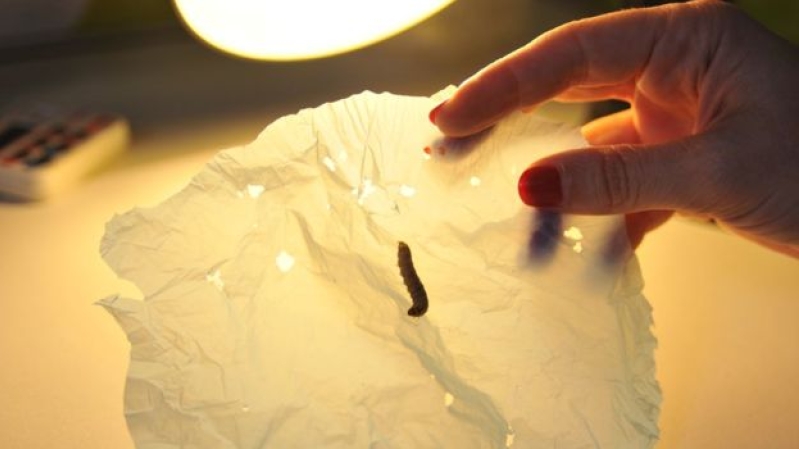
Our earth is creaking on a burden of waste. There is simply too much plastic waste being released into our environment, and the fact that majority of these plastics are not biodegradable at all is another point against the continued use of plastic. In fact, plastic clogs up our seas and waterways if they are not disposed of properly, killing wildlife along the way while upsetting the ecosystem. Sending such waste to incinerators is one way of getting rid of them, but the kind of toxic gases and fumes which result from such action is another issue to tackle altogether. What if there was a creature that crawled on the ground, ready to munch on all of that waste? This is exactly what such a plastic-eating caterpillar does, according to scientists who are excited with this discovery.
Researchers at Cambridge University have managed to uncover such a caterpillar, which happens to be the larvae of a special kind of moth that actually lives off wax in bee hives. This caterpillar is special in a sense where it is also full well capable of degrading plastic. While I am quite sure that no caterpillars were injured in the process, experiments have depicted how this insect is able to break down the chemical bonds of plastic, pretty much in the same vein as to how beeswax is digested.
These caterpillars are the scions of the moth (Galleria mellonella), and they are so ravenous and efficient, you will be able to find holes in a plastic bag in less than 60 minutes. According to Dr Paolo Bombelli, who is a biochemist at the University of Cambridge while wearing the hat of a researcher in this study, shared, "The caterpillar will be the starting point. We need to understand the details under which this process operates. We hope to provide the technical solution for minimizing the problem of plastic waste."
This discovery has already been patented by Dr Bombelli and colleague Federica Bertocchini, who hails from the Spanish National Research Council. The whole idea is to expedite the process of figuring out just what kind of chemical wonders in the caterpillar that paves the way for such natural degradation of plastic. If this process could be “manufactured”, then it would be a huge win for humanity as we can then get rid of plastic in a safe and efficient manner. This does not remove the responsibility of simply throwing polyethylene around just because a “green” method of getting rid of it has been discovered, though.
Do you know just how much plastic polyethylene is produced worldwide each year? We are talking about a whopping 80 million tonnes thereabouts. This kind of plastic polyethylene is used to churn out the likes of shopping bags, packaging for food, and other everyday uses. While light and useful, there is one major drawback -- it would take hundreds of years in order to achieve a fully decomposed state, and at the rate with which we are moving in terms of plastic use, the whole earth would be filled with plastic before a bit of it decomposes. This is a sombre thought that we should all have in mind the next time we go out shopping and are offered a plastic bag, as we should get more creative in our waste disposal methods.







